Kiwi Jam Recipe
This post may contain affiliate links, view our disclosure policy for details.
Kiwi jam is simple to make and delicious! This winter time jam is made with less sugar, no store-bought pectin, and lots of ripe kiwis. It’s also simple to can and it lasts on the shelf for months.
In the past few years, I’ve learned to appreciate winter. With a busy growing season that left me exhausted, I found myself eagerly anticipating the calmness of winter. I simply needed the rest. But then the first few weeks of winter go by, the excitement of the holidays is gone and there I am in January already done resting and complaining that I need my fix of the garden.
Since there isn’t much to do in the garden in January, the kitchen has to provide me with a sense of homesteading accomplishment instead.
Homemade Kiwi Jam Recipe…
I was roaming around the produce section of the grocery store one mid-January morning, trying to figure out what I can can in the middle of winter… I’ve already canned orange jam and grapefruit marmalade, I’ve done lemon ginger marmalade too (recipe on the blog soon)… However, I’ve never made kiwi jam!
I stopped by them because they were on sale. I figured I’d just follow my usual jam process and try turning the good-looking fruit into a jam. The result was surprisingly delicious!
Ingredients For Homemade Kiwi Jam…
This kiwi jam recipe is very simple. You’ll need kiwis of course. Even though you might think about kiwi as tropical fruit, it can actually grow in zones 7-9 and you might even be able to find cold hardy varieties.
Kiwi ripens from October to May and therefore it is a great winter fruit that you can find plenty of in the grocery store. For this recipe I started with 4 pounds of ripe kiwis.
Kiwi are pretty high in natural pectin so there is no reason to use store-bought pectin when making kiwi jam (or any other jam, really…). Since you don’t need store-bought pectin you can use much less sugar than what you’d use in traditional jam. I follow a one part fruit to one half part sugar ratio so I used 2 pounds of sugar in this recipe. You can even use a bit less.
Other than the fruit and sugar you also need the juice of one half lemon and 5 or 6 lemon seeds. The lemon juice adds to the flavor of the jam and the lemon seeds have a lot of pectin in them and will help the jam gel.
With those ingredients, you should end up with 10 half-pint jars of homemade kiwi jam.
Kitchen Tools You’ll Need…
Sometimes it’s possible to peel kiwis with a vegetable peeler but I usually just use a knife. You’ll need a cutting board for dicing the kiwis after you peel them and a wide and deep pan for cooking the jam (that’s my favorite sort of pot for cooking jams). Also, make sure that you have a wooden spoon or a spatula to stir the goodness and an immersion blender or a potato masher to blend and mash the fruit.
You can definitely keep kiwi jam in the fridge if you want, however, If you’re going to can your jam make sure that you have all the canning equipment that you’ll need. I like using half-pint jars for jams. You’ll need new lids but you can reuse the bands. You’ll need a ladle to fill the jars with jam, a paper towel to clean the rim of the jar before closing it, all of the canning utensils, and a water bath canner to process the jars in.
How to Make Kiwi Jam…
Step 1 – prepare the kiwis. Use a knife to peel the kiwis and dice them. Add the kiwis and sugar to the pan.
Step 2 – Bring to a boil. Turn the heat to medium-high, stir, and bring the mixture to a boil. Boil for five minutes then lower the heat and keep cooking stirring frequently.
Step 3 – blend and add lemon juice. After ten minutes or so of cooking, when the fruit is soft, use the immersion blender to blend the fruit. If you want to leave larger chunks you can use a potato masher instead. Then, squeeze the half lemon right into the pot and add 5 – 6 lemon seeds. Stir them in and cook until the jam reaches the gel phase.
To check the thickness of the jam, scoop a little bit with a spoon and lay the spoon on the cutting board to cool for five minute. Then, add the jam back into the pot and as it leaves the spoon it will be easier for you to gauge how thick it is (because a jam keeps thickening as it cools).
The total cooking time may vary depending on how ripe and juicy your fruit was to begin with, but just to give you an idea, it took me an hour and 15 minutes from start to finish.
Canning Kiwi Jam…
Step 4 – pack your jars. While the jam is cooking, fill your water bath canner with enough water to cover the jars by at least an inch. Set it on the stovetop and turn the heat to high. Bring the water in the canner to a gentle boil.
Wash the jars, lids, and rings well with hot water and soap. Since we are going to process this jam in the canner for ten minutes, there is no need to sanitize the jars.
Use a ladle and canning funnel to fill the jars with the jam leaving 1/2 inch headspace. Use the bubble remover to remove bubbles by scraping it along the inside of the jar. Then, use a clean, damp paper towel to clean the rim of the jar before centering the lid and closing the jar with the ring finger tight.
Step 5 – process the jars in the canner. Set the jars on the rack of the water bath canner and lower the rack into the boiling water. process half-pint jars for 10 minutes (and pint jars for 15 minutes). Remember to adjust processing time according to the table below if you live in altitudes above 1,000 feet in elevation
Once processing time is over, turn the heat off, uncover the canner and let the jars rest in the hot water for five minutes. Then, use the jar lifter to remove the jars from the canner. Set them on a kitchen towel on the counter to cool completely, undisturbed, overnight.
Storing Kiwi Jam…
Once the jam is cool, before you store it remember to check that the jars are sealed by pressing the center of each jar. If there is a jar that didn’t seal you can store it in the fridge to use first.
Before storing the kiwi jam, remove the rings (because they rust and stick, and make it hard to monitor the food in the jars) and wipe your jars. Store the jars in the pantry or a kitchen cabinet for up to 18 months.
Serving Kiwi Jam…
Kiwi jam has amazing texture and flavor. The seeds of the kiwis add a nice crunchiness to the spreadable, sweet goodness. I personally love making myself a toast with tahini and jam on top (it’s soooo good!). The kids love eating this jam on crackers with cream cheese or on a bagel with cream cheese.
Kiwi jam can be a thick jam so it can be used to make delicious thumbprint cookies or used in other baked goods. Or, you can add it to sour cream or yogurt with homemade granola. Sometimes we also add it on top of a low sugar zucchini bread to add some sweetness to it or on top of challah bread or no-knead bread. Really, the sky’s the limit!
Kiwi jam is not the most common jam and you probably won’t find it in the store which is a great reason to make it at home. I love the way it looks with the black kiwi seeds floating in it. It makes a great conversation starter. I take my jam with me to the farmer’s market and people are always curious and ask what is in the jar. And it’s delicious! I hope that you’ll give it a try.
More Jam Recipes on the Blog…
There are many other jam recipes on the blog. All of them are made pretty much the same simple way with less sugar and no store-bought pectin. Try this delicious pineapple jam, grape jam, mixed berry jam, strawberry jam, mango jam, cantaloupe jam, or fig jam.
If you are looking for more fall and winter time jams, try this amazing persimmon jam, plum and apple jam, or cranberry apple jam (can be a great substitute to the traditional cranberry sauce).
If you feel like using chia seeds in your jam, try this blueberry chia jam and if you feel like cutting sugar altogether, try this simple sugar-free strawberry jam (you can use this process with any other fruit).
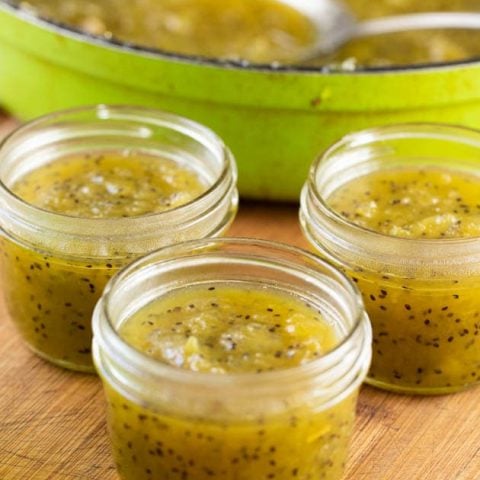
Kiwi Jam Recipe
Kiwi jam is simple to make and delicious! This winter time jam is made with less sugar, no store-bought pectin, and lots of ripe kiwis. It’s also simple to can and it lasts on the shelf for months.
Ingredients
- 4 pounds of ripe kiwis
- 2 pounds of sugar
- Juice from half a lemon
- 5-6 lemon seeds
Instructions
- Use a knife to peel the kiwis and dice them. Add the kiwis and sugar to a wide, deep pan.
- Turn the heat to medium-high, stir, and bring the mixture to a boil. Boil for five minutes then lower the heat and keep cooking, stirring frequently.
- After ten minutes or so of cooking, when the fruit is soft, use the immersion blender to blend the fruit. If you want to leave larger chunks of fruit in your jam you can use a potato masher instead. Then, squeeze the half lemon right into the pot and add 5 -6 lemon seeds. Stir them in and cook until the jam reaches the gel phase (it took my jam around 50 minutes. It might vary depending on how juicy and ripe your fruit was to begin with).
- To check the thickness of the jam, scoop a little bit with a spoon and lay the spoon on the cutting board to cool for five minutes. Then, add the jam back into the pot and as it leaves the spoon it will be easier for you to gauge how thick it is (because a jam keeps thickening as it cools).
- While the jam is cooking, fill your water bath canner with enough water to cover the jars by at least an inch. Set it on the stovetop and turn the heat to high. Bring the water in the canner to a gentle boil.
- Wash the jars, lids, and rings well with hot water and soap. Since we are going to process this jam in the canner for ten minutes, there is no need to sanitize the jars.
- Use a ladle and canning funnel to fill the jars with the jam leaving 1/2 inch headspace. Use the bubble remover to remove bubbles by scraping it along the side of the jar. Then, use a clean, damp paper towel to clean the rim of the jar before centering the lid and closing the jar with the ring finger tight.
- Set the jars on the rack of the water bath canner and lower the rack into the boiling water. process half-pint jars for 10 minutes (and pint jars for 15 minutes). Remember to adjust processing time according to the table in the notes if you live in altitudes above 1,000 feet in elevation.
- Once processing time is over, turn the heat off, uncover the canner and let the jars rest in the hot water for five minutes. Then, use the jar lifter to remove the jars from the canner. Set them on a kitchen towel on the counter to cool completely, undisturbed, overnight.
- Once the jam is cool, before you store it remember to check that the jars are sealed by pressing the center of each jar. If there is a jar that didn’t seal you can store it in the fridge to use first.
- Before storing the kiwi jam, remove the rings (because they rust and stick, and make it hard to monitor the food in the jars) and wipe your jars. Store the jars in the pantry or a kitchen cabinet for up to 18 months.
Notes
Adjust processing time according to the table below...
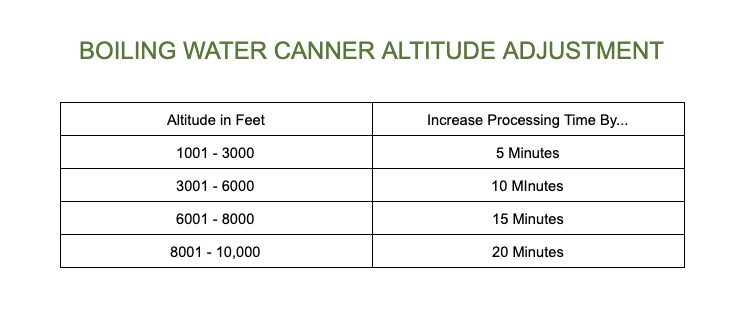
Recommended Products
As an Amazon Associate and member of other affiliate programs, I earn from qualifying purchases (there is no change in product cost or charge to you! Thank you for helping me support the blog).
-
 Heim Concept Organic Bamboo Cutting Board for Kitchen Extra Large Chopping Board with Juicy Groove Perfect for Meat, Vegetables, Fruits, Cheese
Heim Concept Organic Bamboo Cutting Board for Kitchen Extra Large Chopping Board with Juicy Groove Perfect for Meat, Vegetables, Fruits, Cheese -
 Granite Ware Covered Preserving Canner with Rack, 12-Quart
Granite Ware Covered Preserving Canner with Rack, 12-Quart -
 Norpro Canning Essentials Boxed Set, 6 Piece Set
Norpro Canning Essentials Boxed Set, 6 Piece Set -
 PremiumVials 12 pcs 8 oz Mason Jars with Silver Lids for Jam, Honey, Wedding Favors, Shower Favors, Baby Foods, Canning, spices, Half Pint
PremiumVials 12 pcs 8 oz Mason Jars with Silver Lids for Jam, Honey, Wedding Favors, Shower Favors, Baby Foods, Canning, spices, Half Pint

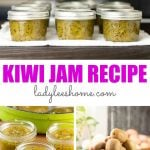

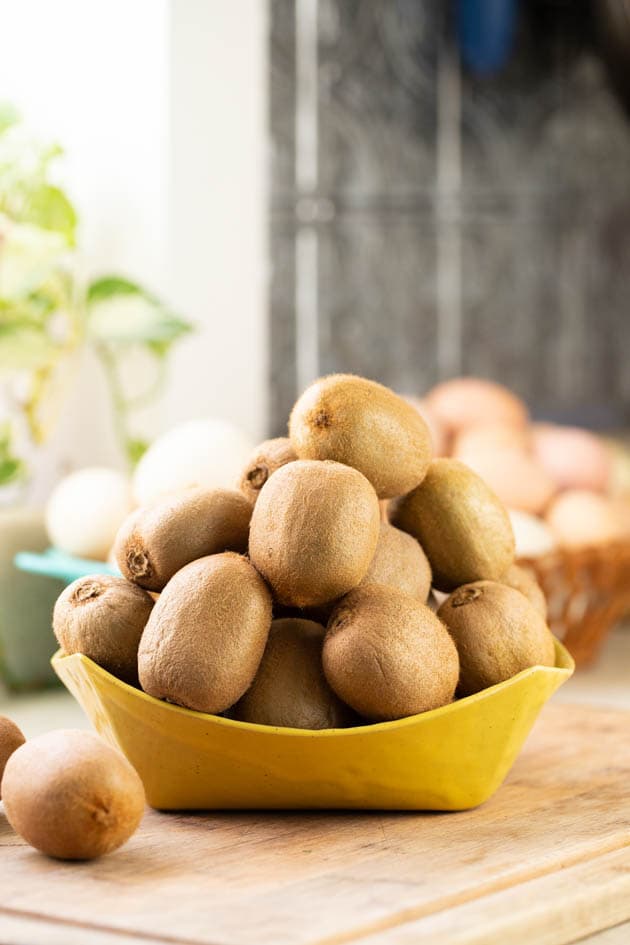


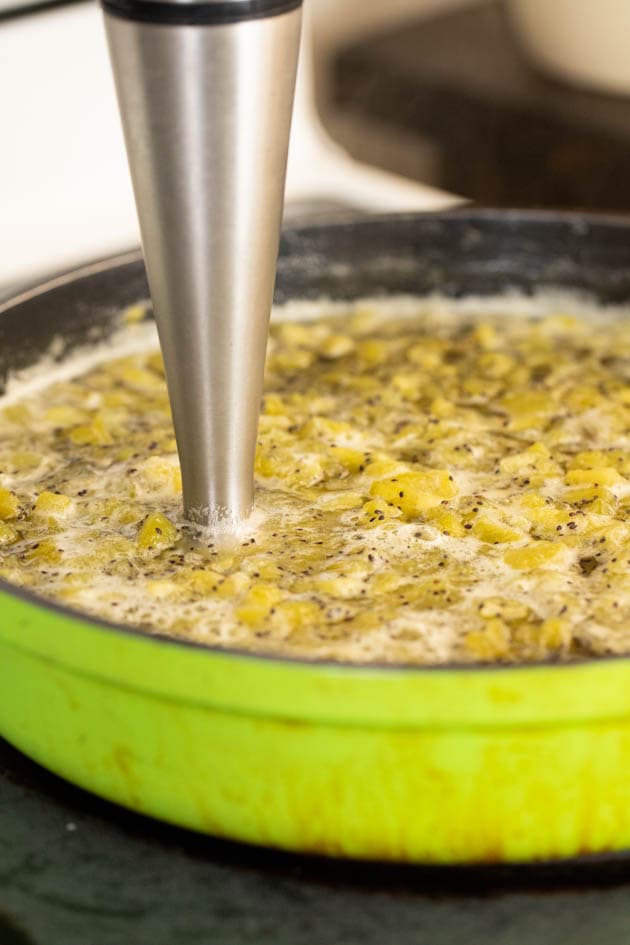
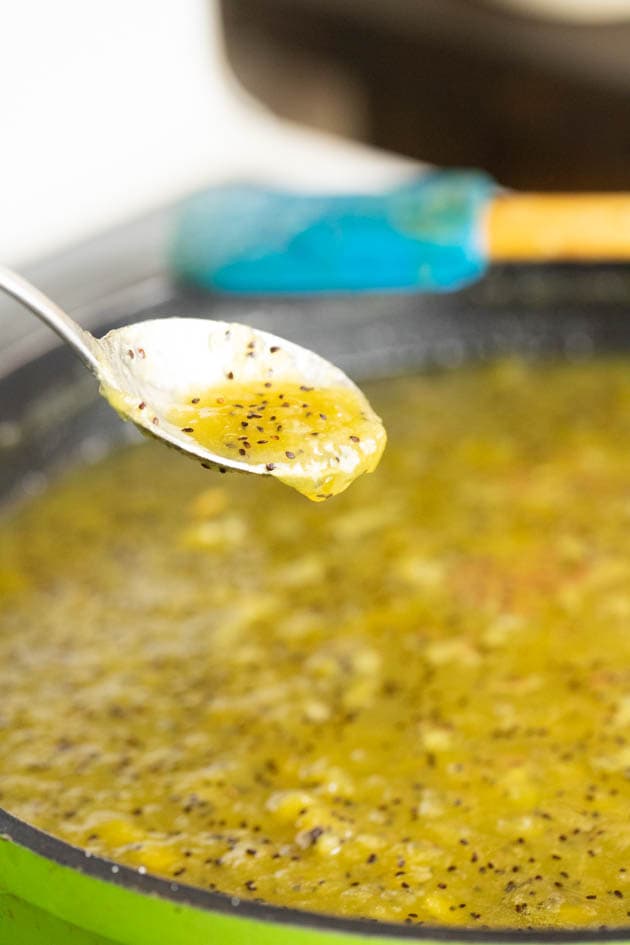
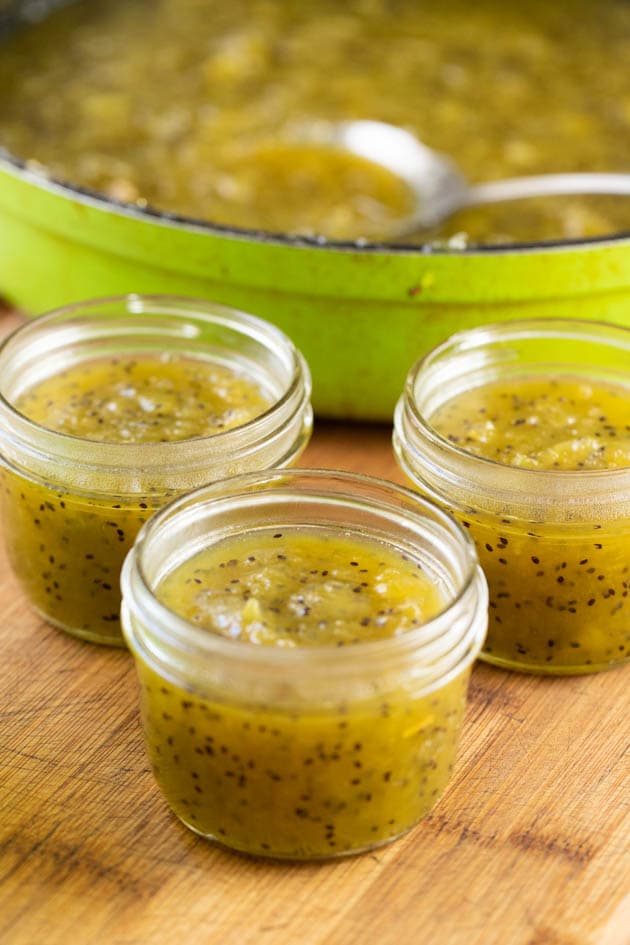
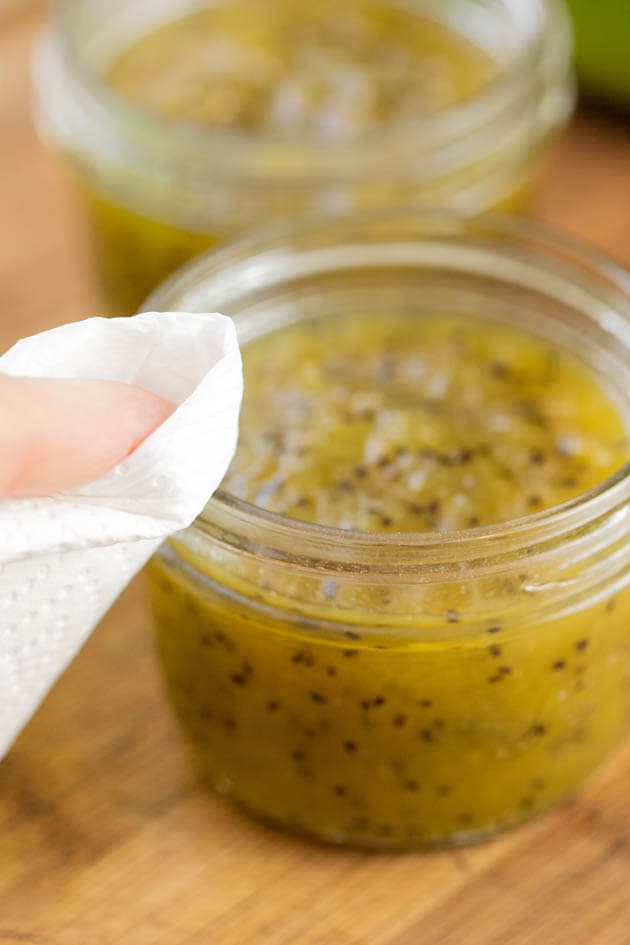
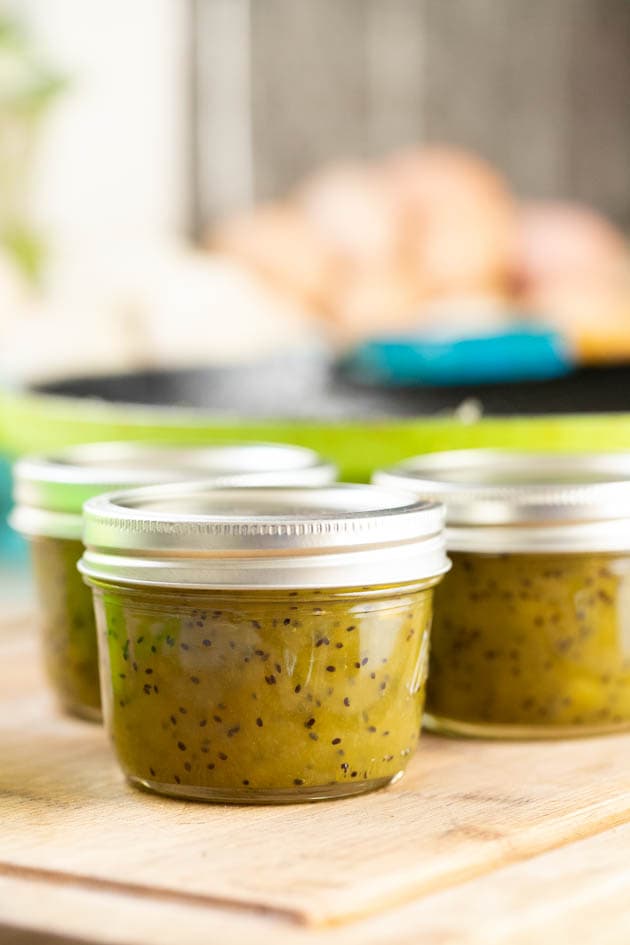
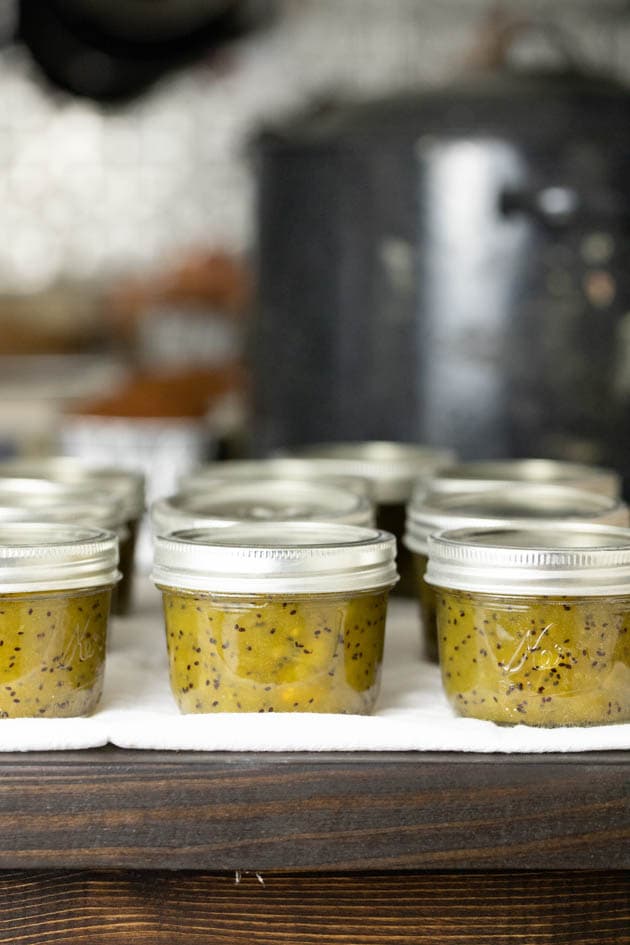




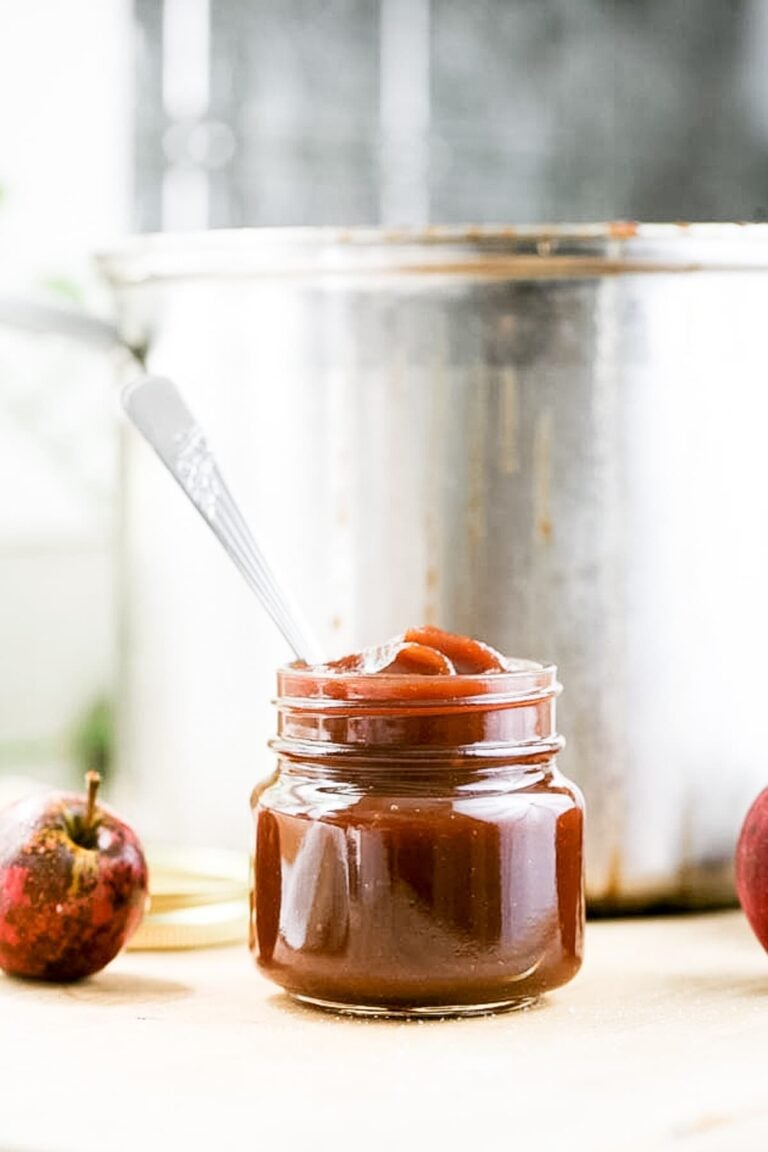
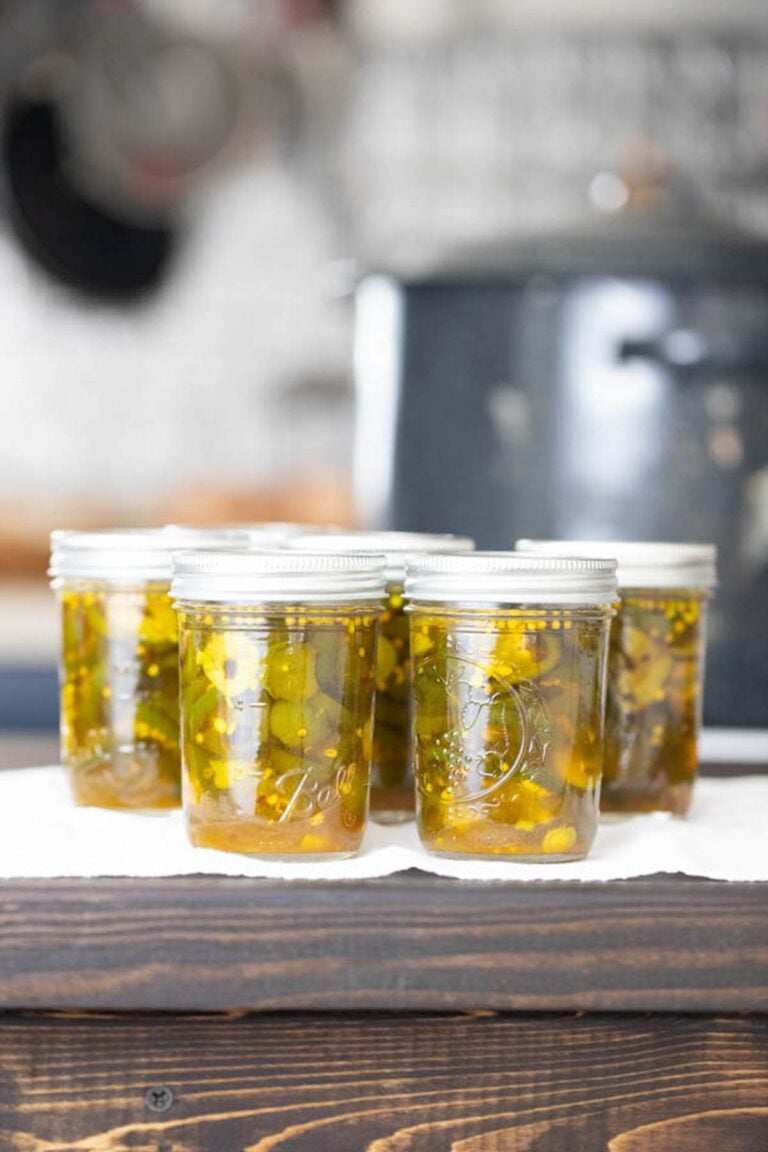
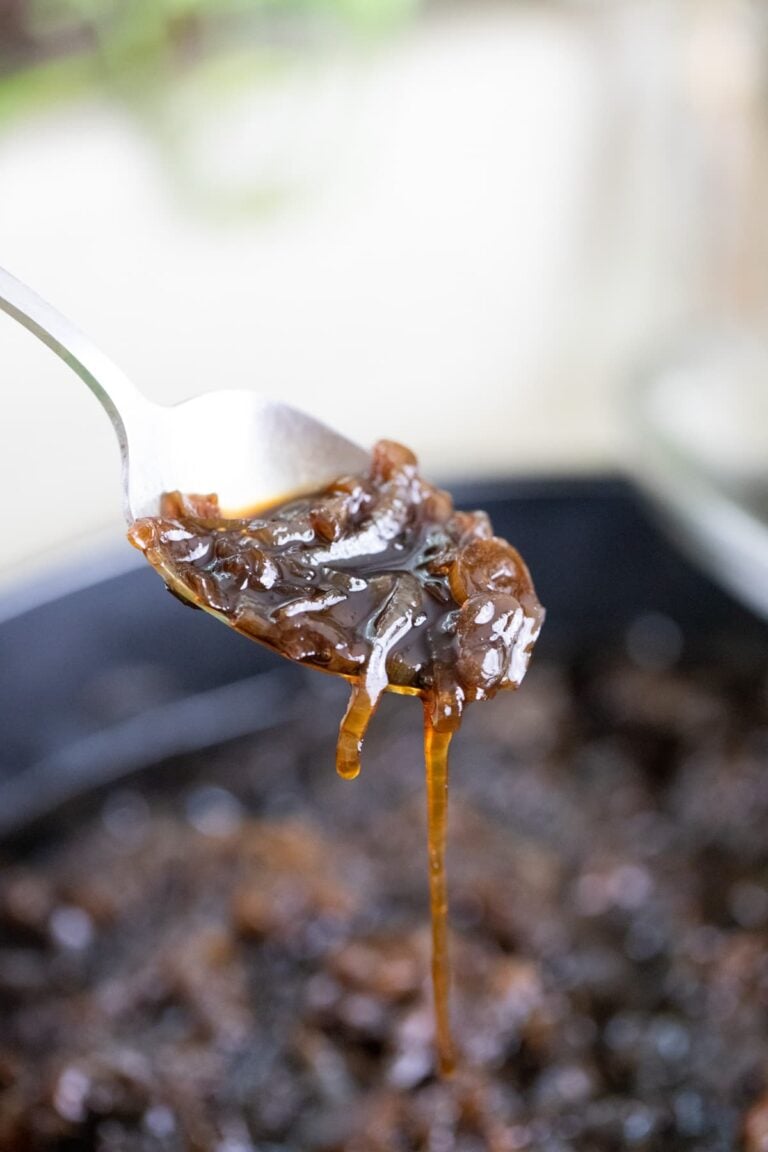
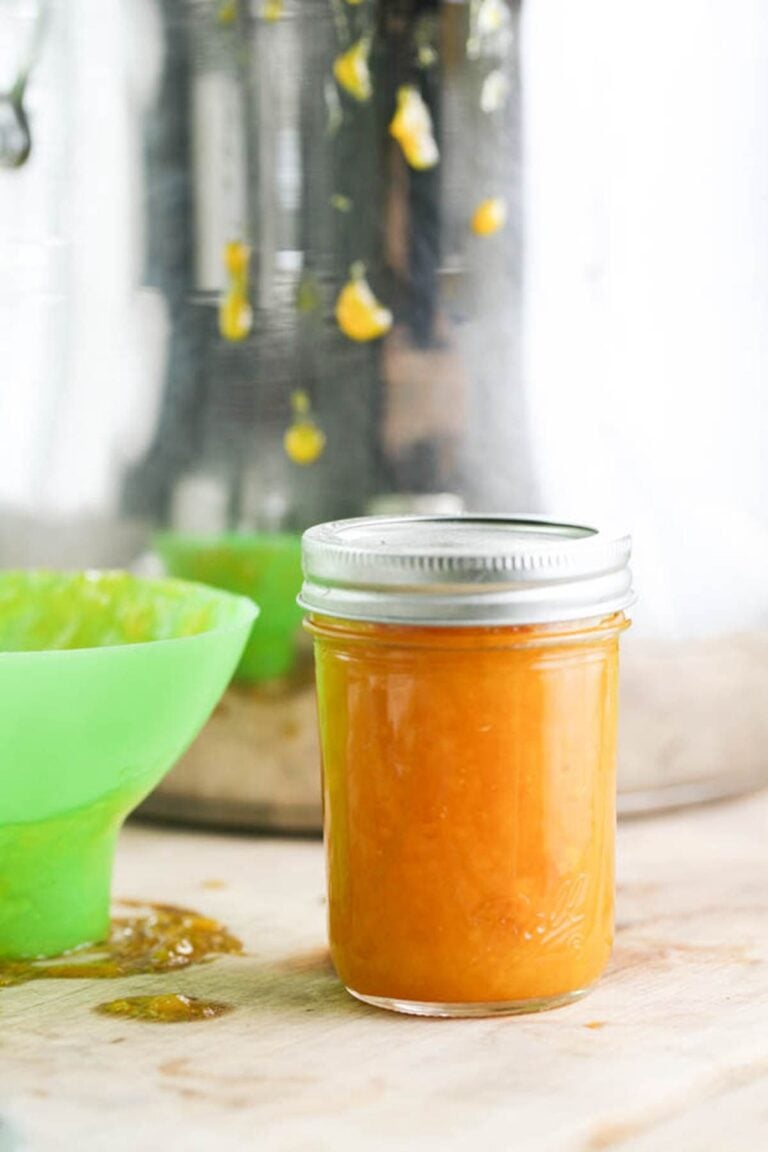

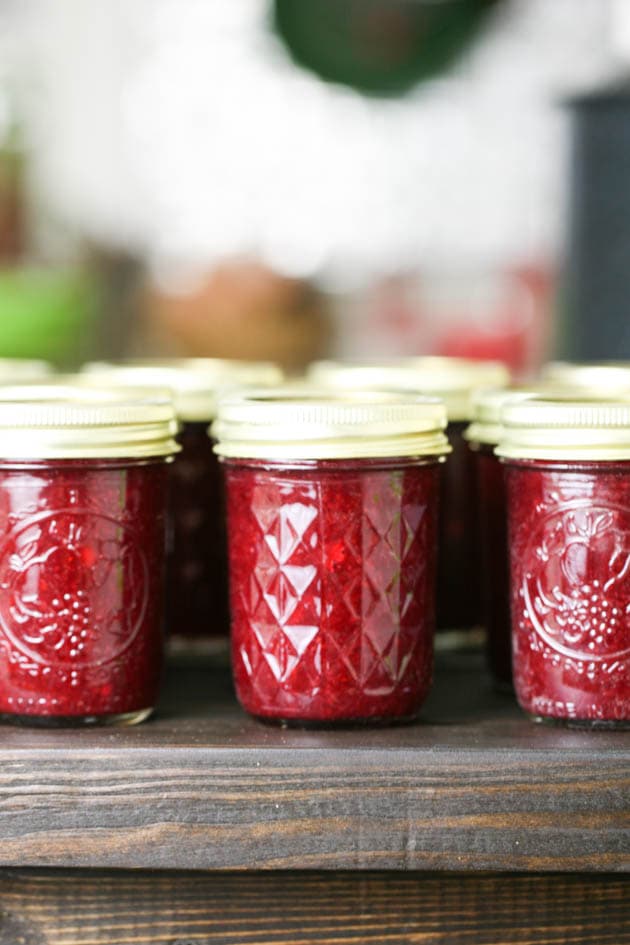
Can you use chia seeds to thicken the jam?
Absolutely!
Did you mean quarter pint jars? A half of a pint is a cup…
Where in the post do you mean? I used half-pint jars for the canning of this jam…
Shalom, I would like to know what is the purpose of the lemon seeds?
Lemon seeds have natural pectin in them. Since I am cutting sugar in half in all of my jams, I can’t use store-bought pectin so instead I am using lemon seeds. They help the jam gel and it’s natural and easy.
Do you leave the seeds in when you fill the jars?
Yes, I do. They don’t thicken the jam any further after it’s done cooking or change the taste in any way.